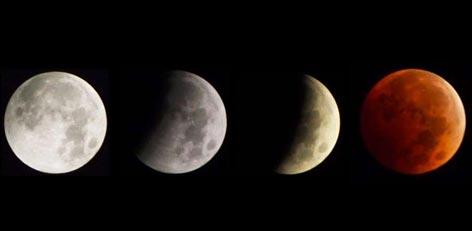Rare lunar eclipse of this century tomorrow (27th July)
Posted on: 26/Jul/2018 3:03:54 PM

The largest-scale lunar eclipse is set to occur tomorrow on Friday, 27th July. The experts have informed that this lunar eclipse can be seen with naked eyes.
As per the Indian Standard Time, the lunar eclipse commences at 11.54 PM (Friday, 27th July). The full eclipse occurs in a gradual process starting early morning on Saturday (28th July) at 1.00 AM and concludes early morning 2.43 AM.
Subsequently, the part-lunar eclipse will conclude at 3.49 AM.
This full-scale lunar eclipse is scheduled to last 102 minutes. This is the longest lunar eclipse in this century. This can be viewed on naked eyes without any harmful effects.
The Birla Planetarium has made arrangements for the public and the students to have a direct view of the rare lunar eclipse via telescopes. 5 telescopes have been set up for this.
The next large-scale eclipse of this magnitude will occur on 25th July in the year 2029. The duration of the lunar eclipse on this occasion is also 102 minutes.
In a similarly rare occurrence, the planet Mars is supposed to be the nearest to Earth on the same day on Friday, 27th July.
The planet Mars comes nearest to Earth from 25th July to 31st July. The distance between the Earth and Mars during this time will be 5.76 Crore km, Mars, which moves in an elliptical orbit, will be at a distance of 38 Crores km from the earth when it is at the farthest distance.
Birla Planetarium has made arrangements for viewing the occasion of the Mars coming directly opposite Earth at the nearest distance.
When a planet assumes a position at 180 Degrees opposite Sun, it is deemed to be in the diametrically opposite position. During this period, this planet tends to be at the nearest point to Earth and also appears larger in size and brighter. Further, the planet will appear in the sky after the sunset and can be seen throughout the night on the sky. It is also mentioned that this would be the ideal time to undertake further research on this planet.







